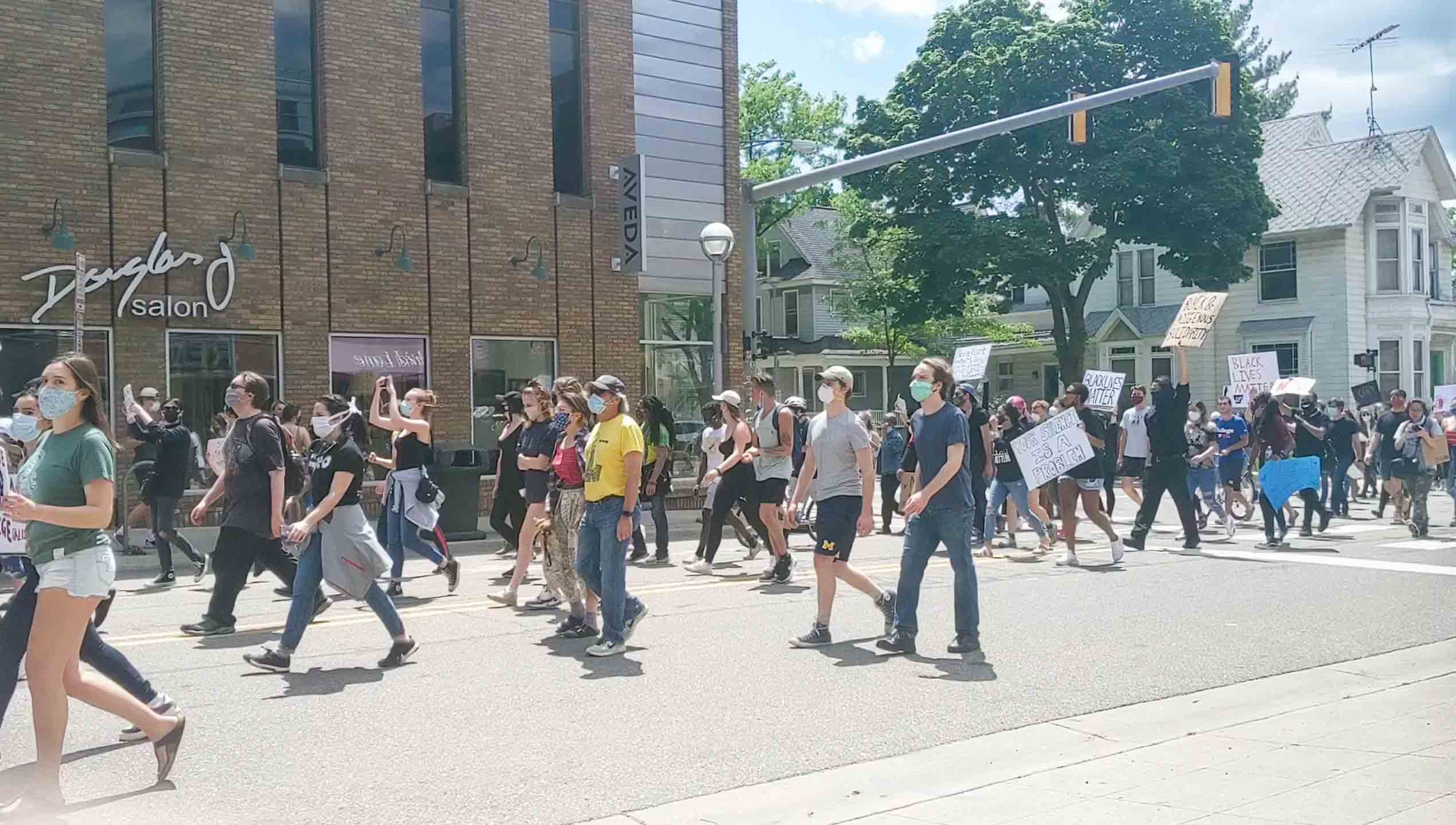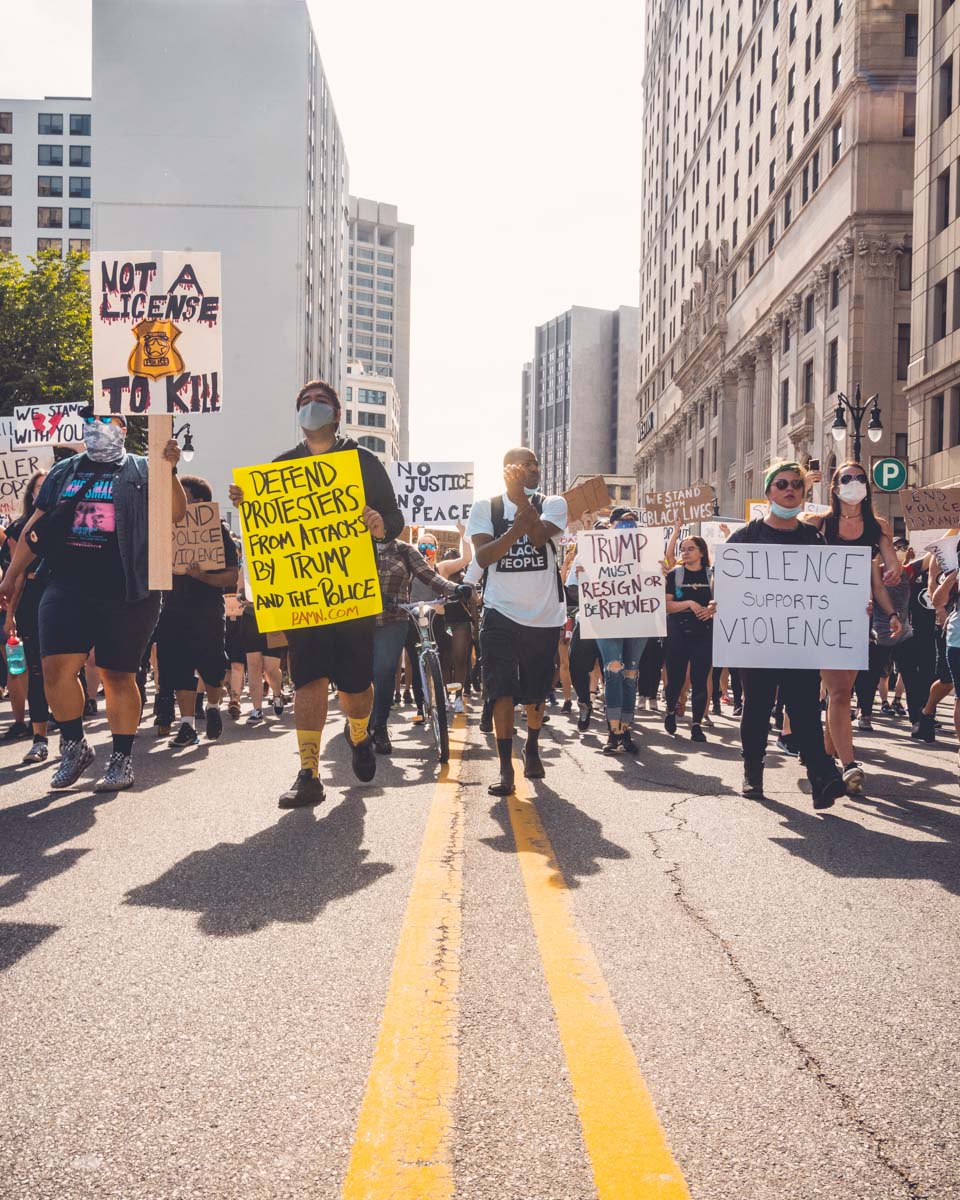
June 6, hundreds of Ypsi residents gathered to protest the recent deaths of George Floyd and Breonna Taylor.
Torrence Williams | Washtenaw Voice
By CYDNEY HEED
Editor
Former officer Derek Chauvin was convicted of murdering George Floyd on April 20.
The incident, which was caught on camera, ignited fury across the United States. After watching so many police misconduct cases result in exoneration, activists have questioned whether the verdict represents a turning point in the fight for police accountability.
“In large part, I think the visceral response of watching George Floyd die right before our eyes was just too much. I think that most people realized that that was unreasonable, inappropriate, and nobody should die that way, but we actually watched it,” said Lisa Jackson, Chair of the Independent Community Police Oversight Commission.
As part of her role as chair of the ICPOC, Jackson became a Certified Professional of Oversight. She is also a member of the Michigan Commission on Law Enforcement Standards.
Jackson said that, while the verdict represented a degree of accountability, it did not represent justice.
“It’s not justice, because justice would be George Floyd walking around today…but there is accountability in that this first officer was held accountable for his behavior,” said Jackson.
Referencing the original police report that was released in the immediate aftermath of Floyd’s death, Jackson said, “I think true accountability would come back and say, look, that report was inaccurate at best, and here’s what we’re doing going forward to make sure that we’re catching things and discouraging this kind of behavior in the future.”
That report stated that Floyd had died of a “medical incident” while in custody. The full story came to light when video of Floyd’s death went viral.

June 3, a Black Lives Matter protest forming in the streets of Downtown Detroit. Torrence Williams | Washtenaw Voice
While Jackson is still unsure whether the verdict marks any kind of “turning point” in the movement itself, she did say that she thinks “that there is a bit of a turning point in that there was significant attention paid to this.”
“There was also significant community involvement locally and nationally that was brought to bear,” Jackson said. “And so it was very clear that the world would be watching how that was handled, and I think that influenced some of the decisions that were made.
“To bring that home locally, in Ann Arbor, our county prosecutor Eli Savit, has indicated that if there is a police misconduct trial that he will not try to hang onto the case, that he will refer it to the state attorney general.”
Jackson noted that the Ann Arbor Police Department faced controversy following the fatal shooting of Aura Rosser in 2014. The incident was one of the main reasons that the ICPOC was created.
In Dec. 2020, MLive reported that only 1 in 43 complaints made against the AAPD resulted in discipline.
According to Lieutenant Mike Scherba, “Every complaint gets investigated, but not every complaint results in a finding that the officer’s conduct was not proper.
“Of the citizen complaints that we get, probably about half of them will result in what we call a founded disposition… And of internal complaints, it’s actually quite a bit higher than that.”
While the past decade has seen numerous examples of protests against police brutality, those that took place following Floyd’s death were noteworthy because they drew an amount of support that would have been impressive regardless, but was even more so during a pandemic.
“I think probably in many people’s lifetimes the protests that we saw last summer were unique in that they lasted as long as they did, that they involved as many people as they did, and that they were as widespread as they were,” Jackson said. “So I think that’s different than anything we’ve seen in the last few decades.”
Jackson compared the outpouring of support to the attention garnered by events such as Bloody Sunday during the Civil Rights Movement in the 1950s.
“They were mobilized from all over the country to go to the South and protest,” Jackson said.
Scherba believes that social media has played a significant role in igniting calls for police accountability.
“If something happens in another city, another state, it affects us now,” he said.
Jackson emphasized that there is still progress to be made. One thing she would like to see is an end to qualified immunity for police officers.
“That means that police officers would have to be held personally responsible for their behaviors,” she said.
Jackson also said that she would like to see information on police misconduct made available to the public.
“It’s very important that we maintain records of officer misconduct, that they are available to the public, that they are nationally available, and that there is a legal requirement that municipalities and police departments contribute to that database accurately, and that they are required to check it before they hire police officers,” she said.

